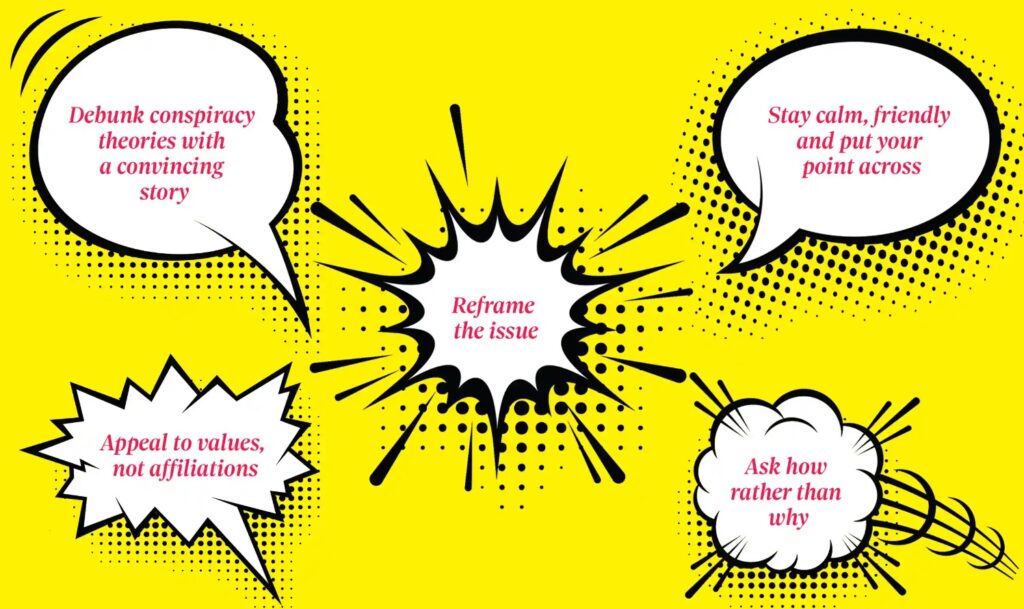Anyone can get into a dispute but how can they win the argument? Building successful arguments is one of the most crucial aspects of a lawyer’s practice. Of course, it involves oratory skills, but that’s only the tip of the iceberg. People also need to know how to “win” disputes on social media and with their spouses.

How to win a dispute
People will have different reasons for reading this blog. Some people will want to learn how to argue with their spouses. Unless you want to need a family lawyer in the near future, this is not a good reason to learn how to argue.
But if you are a law student or someone who is self-represented and is going through the legal system, then looking at how to persuade someone is a valuable skill. Others want to learn how to argue to win disputes on Twitter or Reddit. Getting what you want by using logic, facts, and evidence is different than getting into an argument. No one wins during an argument.
If you are in a legal dispute, keep in mind that judges are professionals, and you will likely fail if you try to manipulate them. But if your goal is to “win a dispute on social media” it’s easy to “win” by using personal attacks and misleading people. How you win will depend on who your audience is.
Win by being right, instead of being dishonest. You can use a website called CanLII to see how lawyers have won (or lost) cases in the past. Look at how some people convince the courts or tribunals that they are right. For example, see the case on CanLII. You can search the website for Vigier v. Read, 2021 BCCRT 624 (CanLII). It was heard in the Civil Resolution Tribunal Small Claims division.
A lawyer in Duncan BC, Barbara Read, suggested that a legal fee was a gift from her client. The Tribunal did not agree.
Winning argument with wife
Sometimes it can be hard to deal with an argumentative child or spouse. Some might say that it’s impossible to win a fight with a family member. When you fight, everyone loses. No one wins during a divorce. The courts normally just propose what is fair, which might be something in the middle of what both spouses want.
But if you want to “win” against your spouse, it’s not much different than arguing with someone on social media, or on the street.
The main difference is that your spouse knows you well and that you need to live with them going forward.
Try to avoid all arguments with spouses, even if you know you are right. Sometimes just saying “yes honey” is much easier than fighting. You can see our do’s and don’t further down in this article.

How to deal with argumentative people
Think about not dealing with them at all, as a first step. You don’t need to give people your attention and allow them to influence your emotions. Do you really need to fight with that person about your political beliefs on Twitter?
We have seen cases where people are using websites that don’t care about harassment and defamation (like Reddit) to harass other people. Reddit very rarely takes the information off its website. The people being harassed often get very upset and speak to a lawyer.
Win An Argument
Unless someone is willing to spend a lot of money suing Reddit there’s not much you can do. When someone posts something that’s completely crazy online, you can hope that other people will see right through it. Intelligence people will understand that it’s just defamation, and there’s little to no truth to it.
Here is an example of one of the cases of how to deal with argumentative people, and how to get try and get information taken offline. Again using the Reddit example, here is what happened.
Look for alternative viewpoints
The posts were clearly being used as a weapon. The poster of these comments had created multiple Reddit accounts, which were used to upvote each other’s comments and comment on the original Reddit posts.
The posts were clearly and deliberately provocative and involve unsubstantiated allegations that “Steve Smith” was a “scammer,” “fraud,” and a fake veteran. There were no details provided. It’s worth noting that Mr. Smith was released from the military for a condition similar to PTSD. Those harmful posts made Mr. Smith’s chronic condition worse.
Win An Argument
Steve Smith was medically released after being shot in the Canadian Forces in 2007. He was in the army for six years. The Reddit user indicates that he was in the cadets, with the hope of causing Mr. Smith to experience extreme anger and insult.
The content violated defamation and harassment laws, as well as Reddit’s policies. The postings came from two user accounts on Reddit, which were almost certainly the same people as they were created on the same day. The content was the same and had been posted from multiple Reddit, Gmail, and Glassdoor accounts.

Watch your body language
It was clear that the posts were malicious and reckless. They were posted with the clear purpose to cause anxiety, and emotional upset, and causing people to have doubt in Mr. Smith. Mr. Smith has suffered emotional and reputational harm due to the posts.
At the end of the day, Reddit would not remove it. Sometimes even when you put forward strong evidence, and explain which company policies the posts violate, many companies don’t care.
Part of arguing with people and companies is understanding that at the end of the day, even when you do your best and follow the law, you might not get what you want. At the end of the day, people often have a constitutional right to say what they want.
Getting Ready To Argue In Court
A lot of preparation, deliberation, years of experience and practice are also key to success in any courtroom trial. A lawyer has to be sharp and strategize his moves to move an argument against an opponent. It’s almost like the game of chess.
Your law school teachers and mentors may have given you tips on your oratory skills. They may have urged you to become more persuasive.
But did anyone tell you how you can win an argument?
Sorry to say, unless you’re tossing a coin to decide the winner, LUCK has no role to play here.
Today, we’ll talk about what matters most when it comes to winning an argument. Learn to put forward evidence like a lawyer and win no matter what. We put together some tips on how to win a dispute below.
Prepare Your Case
Before you enter the courtroom, you should have thoroughly gone through the case files. Study the facts and understand the governing law. Unless you know all the ins and outs of all the legal rules and regulations that govern the case, you can’t build compelling arguments.
You need to know the facts and the law.
Build a structure for your arguments. There will be two or three main issues that you’ll discuss in court. Find points in favour of your case that revolves around these issues.

Win An Argument
When you’re arguing your case, emphasize the facts. Prepare a case brief so that you can quickly brush your memory before appearing for arguments. Having a few pointers listed in a notebook can help you quickly relate important facts of the case with your arguments.
Don’t base arguments on personal opinions. Subjective arguments are hardly persuasive. Present an objective argument. State the facts that the opponent cannot deny, and build your argument around them. If you must state an opinion, make it clear that it’s a personal view. Whatever the situation, never lie in court.
Be Mindful of The Evidence
Facts and strong supportive evidence can lay down the foundation of your winning arguments. Be careful to choose evidence that will be admissible in court. If the evidence isn’t admissible, it will only hold a persuasive value. You won’t be able to establish your argument or prove anything with certainty. Pay attention to the rules of evidence to check if you’re basing your arguments on the right evidence.
If you are upset with your neighbour’s barking dog, you might record the dog barking at 2 am and present it as evidence.
Choose Your Opening
Lawyers with strong arguments can intimidate their opponents with just an impressive opening statement. We’re not suggesting that you get cinematic with your oration. But yes, you need to put forth your strongest arguments first.
Your opening statement should be simple, direct and effective. Start by presenting the theme of your case engagingly, and then narrate the case like a story. When you open up with facts and evidence that are strongly in your favour, your presentation becomes credible from the beginning. Observe a few courtroom trials and make a mental note of how successful litigators open their argument

Picture: Getty Images/Observer Design
Don’t Get Desperate
Every legal case is like a coin with two faces. While there may be a few facts and evidence in your favour, there’ll also be some which weaken your case. Unfavourable facts can also be brought up by the opponent during the trial. Or your opponent can deliberately put you in a difficult spot. In an unfavourable situation, don’t act desperate or emotional. Have the plan to tackle such situations.
For instance, if your client is claiming against a big corporation like PG&E in a lawsuit connected to the California wildfires, the opponent may use delaying tactics and other tricks to minimize the settlement amount. Instead of feeling pressured to settle for a lesser amount, you can advise your client to avail of a PG&E lawsuit loan. Such steps also count toward an effective strategy for winning arguments.
Don’t Ignore the Procedure
Everything in the court should go according to the prescribed procedure of law. The procedural law governs when you can present your arguments, and when and how you can call witnesses and submit evidence. Pay due regard to the legal procedure at all times, or your argument/evidence will be dismissed by the court straightaway.
If you don’t follow the procedure, the opponent will find an opportunity to raise objections and get your argument dismissed.
Don’t Lose Focus
When you make oral submissions before the judge or jury, your statements should be concise and clear. Focus on the subject matter and your client’s claim. Don’t jumble up facts and evidence. Everything you say should follow a logical and clear line of reasoning. Organize your oral submissions point-by-point leading up to the conclusion you want the judge or jury to arrive at.
Whenever you’re answering a judge’s question or presenting an explanation for the opponent’s objections, your statement should be clear and to the point. There should be no room for confusion.
Think Ahead For Probable Objections
Always consider the case from the opponent’s viewpoint. Before appearing in court, you should have already thought about the most likely objections and prepared the rebuttals.
Think logically. What questions can the opponent raise? What evidence can be presented by the other side? Which arguments you can counter and which facts you will have to concede?
Be A Good Listener
Listening is very important for winning any argument. Your arguments can’t just hit the wall. You must acknowledge what the judge and your opponent are speaking about. Take note of their reactions and pay attention to every detail.
Unless you understand the other party’s contentions, you’ll not be able to frame compelling arguments. Listen carefully to the court proceedings and witness submissions. Your presence of mind can help you easily steer statements in the favor of your client.
Be Civil
Don’t lose your composure when presenting your arguments. Be firm but polite. Your arguments should be persuasive but effortless. Your body language, and not the tone of your voice, should speak of your confidence.
Avoid making accusatory statements. Don’t deliver orders or instructions to the opponent while arguing in court. A judge may treat that as contempt of court.
You can see the video below of two people (one of who is Boris Johnson) who are making good arguments.
But it doesn’t sound good, two people talking over each other. The moderator does a poor job of guiding the conversation. It quickly goes to personal attacks. I’ve heard podcasts that focus on logical fallacies instead of using evidence. If you want to win the argument, listen to some expert interviews. Listen to how they present their reasoned argument.
You can try and find videos of lawyers arguing in an appeal court on Youtube. Here is a video of what not to do in court.
Dos during a dispute
Deep breathing- Wikihow has a good list of things to do, one of which includes taking deep breaths. Dale Carnegie, who used to speak on self-improvement, also suggests staying calm. Here is a good video about him.
Present evidence and facts- Follow how lawyers present in court. Watch Youtube videos.
Try to understand- You want to know how to win, but it’s also important to try and understand what they are saying.
Listen to your opponent- Understand and listen.
Do not during a dispute
Below are some things to avoid. You might have seen Donald Trump use some of these before, especially exaggeration and personal attacks.
Personal attacks- Much of the research sources that we read suggested avoiding personal attacks. It just makes you look bad.
Not paying attention to what they are saying- Listen to every word, and think about how you can hit them back with “one-liners.” Once in court, someone said, “it’s not like the delay caused someone to die.” And the person arguing for the other side, Alistair Vigier, said “Actually someone did die, the Plaintiff.” It really took the steam out of the lawyer on the other side. The judge ended up agreeing that the delay had caused prejudice.
Win An Argument
Not putting your best arguments first- Many people want to know how to win disputes, but then they put their weak arguments first, instead of their best arguments. This is how you lose.
Making fun of them- Wikihow suggests staying calm and not always needing to “add your piece” to the argument.
Exaggerating too much- It really depends on who you are arguing with, and who the audience is. There is something called a red herring. This is when you take what your opponent has said and twist it. This sort of thing works well on social media, but not in court. If someone says something, you exaggerate it and then attack them on what they didn’t say.
How to always be right
We found this video below that quickly went from 4m views to over 10m! The video talks about how to use the mind to win arguments.
Of course, some people are of the position that it’s impossible to win an argument. Instead, they suggest thinking about alternative viewpoints. You can work at putting yourself in your opponent’s position and trying to avoid an argument altogether. Instead of losing your cool, take a view deep breath, and actually, listen to your opponent’s argument. See if what they are saying actually makes sense.
Win An Argument Final Outlook
In everyday life, it’s alright to agree to disagree. But this is not how things work in the courtroom. In a lawyer’s life, every case is a win-or-lose battle.
He must argue with all his might to claim victory. With the strategies we have shared today, we’re sure you’ll feel more confident in arguing your next case. With patience and practice, you will surely win many arguments and cases.
We hope you now know how to win an argument. Share this on social media so others can learn! Check out the links and videos in this article to learn more.











